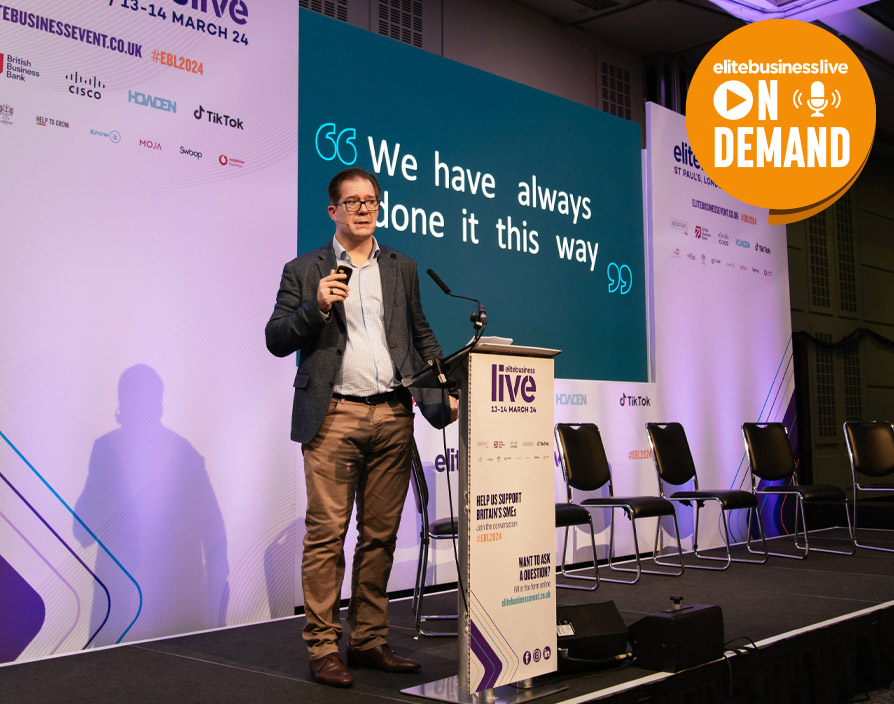Digitalisation is the way forward. Using digital technologies to change your business model can provide new revenue and value-producing opportunities. To stay competitive, many businesses are now adopting the latest innovations and fully integrating them into their operations. Alex Von Schirmeister, Managing Director of Xero UK & EMEA took to the stage for the Finance keynote speech at Elite Business Live 2024, speaking about the challenges and opportunities of digitalisation for SMEs.
“The reality is that our life in the last 15 to 25 years has completely been changed,” Alex said. “We have all digitalised. I haven’t had a landline in eight years. I got rid of my satellite and TV box about four years ago. Everything I watch is now over the internet… Nearly 90% of the world’s data that has been generated in the last two years has been by all these connected devices.”
Firms must evolve quickly or risk falling behind as we enter a digital revolution, Alex said. Digitalisation is at full-force and businesses need to be open to new ways of working to reap the rewards. “What are the seven most expensive words in business? ‘We have always done it this way’,” Alex said. “The inertia of not wanting to change the inertia of not wanting to digitalise and leaving the door open to someone else doing it on your behalf is the most expensive mistake we can make in business.”
SMEs make up the backbone of Britain’s economy. However, small businesses face several challenges pivoting through this digital revolution. SMEs don’t have as many resources as large businesses and, therefore, face more hurdles in their digitalisation journey. “SMEs are a massively important sector and one we need to pay attention to because you pack a mighty punch, so we need to move away from this one-size-fits-all all approach… and focus on the specific barriers of what is holding back the smallest of businesses,” Alex added.
Since 2019, only 30 per cent of SMEs have increased their digital tools or adopted more digital technology, according to research by Xero. With large businesses, the figure stands at 69 per cent. Seizing digital opportunities could mean a £77.3 billion boost to SMEs. But why are SMEs shying away from digitalising their business? There are still fears lurking around additional costs and workload, Alex explained: “I still hear too many organisations in too many think tanks or trade bodies, seeing digital digitalisation as a distraction to small businesses or as additional workloads,” he said. “Yes, there’s an effort involved. But there are tremendous benefits to getting it right.”
Adopting greater automation and digitalisation will help SMEs improve efficiencies and enable them to remain competitive amid ongoing economic uncertainty. Digitalisation can help run businesses much more smoothly, boost productivity and reduce costs with better efficiency. While digitalisation may sometimes be difficult, it reaps tangible benefits and helps businesses accelerate their growth, Alex explained.
So how do we encourage SMEs to digitalise? Alex believes the government should take action and create a body in charge of digitalisation to help small businesses in this area. He also believes in creating incentives to encourage small businesses to digitalise. “There are too many individual branches of government bodies looking at digitalisation across specific segments,” Alex said. “There is no cross-government collaboration on a digital task force who fundamentally look at small businesses of fewer than 10. We also need to look at tax treatments and funding and make sure that there are incentives for small businesses to be able to digitalize and to deduce that from tax liabilities in the future.”
How can small businesses digitalise their operations? SMEs need to start small and gradually add on tools rather than completely digitalise the entire company in a day. “The best approach is digitalising the lowest hanging fruits and then moving up from there,” Alex explained. “Where we see the biggest struggle with small businesses is when they try to do a whole transformation around the entire business with various tools or technologies and systems at the same time.”
Small businesses need to do a “cost-benefit analysis” when it comes to digitalisation, Alex said. Companies should weigh the pros and cons of adopting new tools to speed up processes. Though this may be an additional cost, it can benefit businesses in the long run and make things less expensive overall.
Share via:








































